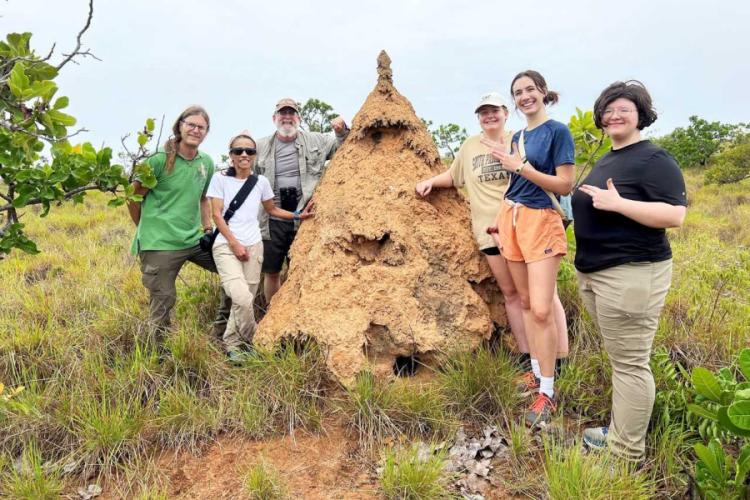NACOGDOCHES, Texas — Dr. Carmen Montaña, assistant professor of biology at Stephen F. Austin State University, led an international research expedition funded by National Science Foundation to study freshwater biodiversity in rivers in the Guiana Shield, a tropical region in South America facing environmental challenges.
The international collaborative research team included Drs. Brent Burt and James Van Kley, SFA biology faculty members; three SFA undergraduate students supported by the NSF’s International Research Experiences for Students program: Lily Williams, junior biology major from Hudson; Sophie Scott, senior environmental science and journalism major from Houston; and Megan Beeksma, senior forestry major from Temple; as well as students and faculty from the University of Guyana and Texas A&M University.
Guyana is a developing country in South America that contains a high freshwater biodiversity. However, gold mining, logging, agriculture expansion and petroleum extraction are increasing with impacts to freshwater ecosystems and associated biota. Gold mining is a particularly serious concern because it contaminates rivers and streams with mercury, which enters food webs and ultimately affects human health, especially for rural communities that depend heavily on inland fisheries.
The team conducted research for a month over the summer by surveying freshwater habitats of the Rupununi River, a tributary of the Essequibo River in the heart of the Guiana Shield in Guyana. Students received extensive training in research and sampling design, surveying of aquatic systems using different fishing methodologies, data collection, and specimens processing and preservation to address human impacts on aquatic ecosystems.
Montaña, in collaboration with Guyanese and Texas A&M colleagues, has been conducting research in freshwater ecosystems in Guyana for more than 14 years.
“The overarching goal of this research project in Guyana is to examine the aquatic community’s taxonomic and functional structure, aquatic food web structure, mercury contamination in aquatic fauna, and current environmental conditions in rivers of the Essequibo Basin, which are relatively undisturbed,” Montaña said. “To achieve this goal, students surveyed aquatic biota in these rivers, collected environmental data of different habitats within these major rivers, measured fish functional traits, and collected tissue samples for stable isotope and mercury analyses.”
Upon returning to the United States, students were trained in laboratory techniques, samples processing and data analysis to advance in their research projects. Throughout the fall semester, students will work with faculty mentors and collaborators from other universities using the data collected over the summer to complete their independent research projects.
As part of their training, each student participant will write a report on their individual project and present the results in scientific meetings in the spring 2024 semester. These student project findings will be submitted for scientific publication.
SFA undergraduate students experienced a unique culture, received training, and were mentored in ecological and biodiversity research in rivers in Guyana.
“Being a part of this research team has been wonderful, and I'm incredibly thankful for the opportunity to learn and build research and collaboration skills in this way,” Williams said. “It is hard to articulate how excited I am to continue working with the data collected in the field and how grateful I am for the opportunities I believe this experience will open for me in the future.”
For Scott, the research trip was an opportunity to foster professional and peer relationships and gain knowledge of a new culture while conducting research.
“This was the trip of a lifetime that taught me more than I can articulate,” she said. “I was able to work with an indigenous community; gain knowledge about fish species, biodiversity and environmental parameters; and leave feeling passionate about school. The opportunity to do international undergraduate research in Guyana reinforced my respect, love and wonder for the world around us.”
The Guiana Shield ecoregion in northeastern South America extends across the countries of Guyana, Brazil, Suriname, French Guiana and Venezuela. It is known for exceptional aquatic and terrestrial biodiversity, including high levels of species endemism. This region remains poorly explored, and early indications are that hundreds of species remain undescribed.
“This NSF project is funded from 2022 to 2025 and will continue to build upon ongoing collaborations that have surveyed aquatic habitats and fish diversity, discovered and described new species, documented areas of conservation concern, assessed impacts of mercury contamination in freshwater organisms, and identified areas suitable for field research by our students,” Montaña said.
Montaña is recruiting new SFA undergraduate students to participate in a 2024 international research expedition to rivers in the Guiana Shield. The selection process will start in fall 2023. Contact Montaña with questions at montanascg@sfasu.edu.
To learn more about aquatic biology at SFA, visit sfasu.edu/biology.
 Axe ’Em, Jacks!
Axe ’Em, Jacks!
